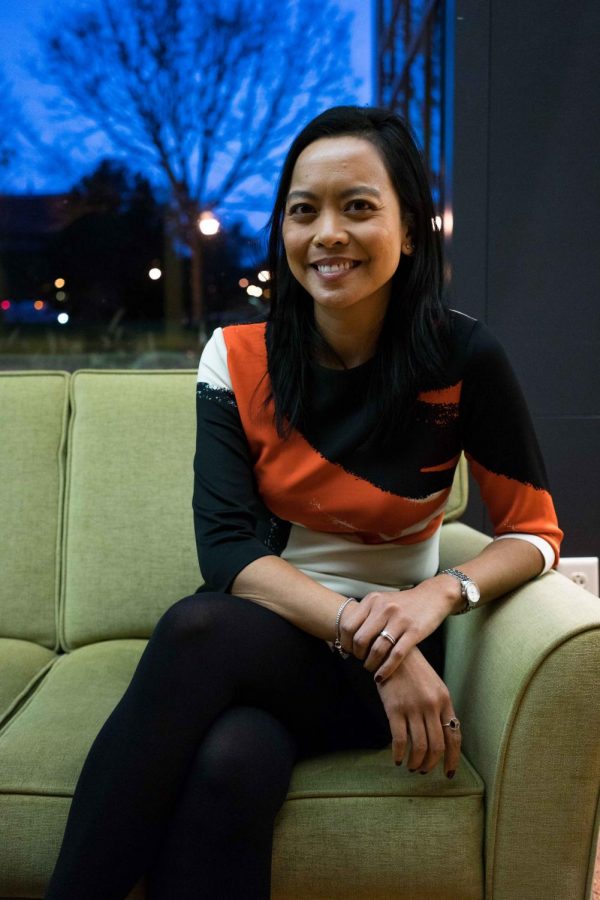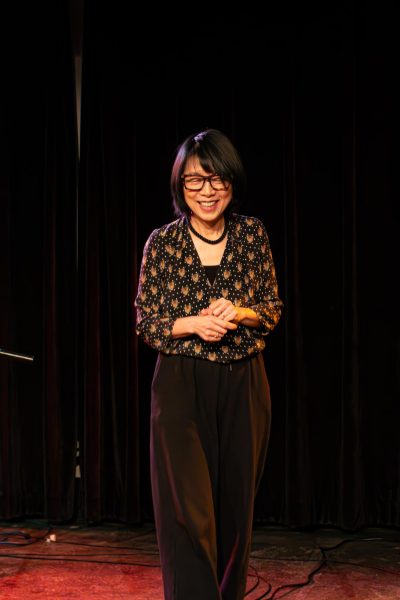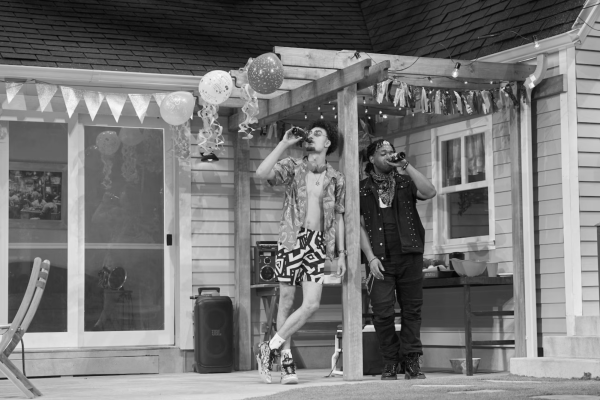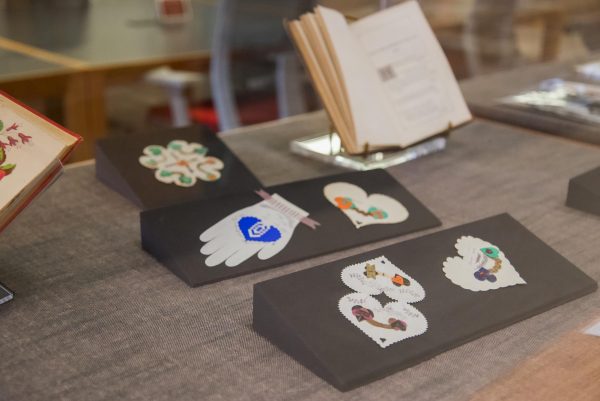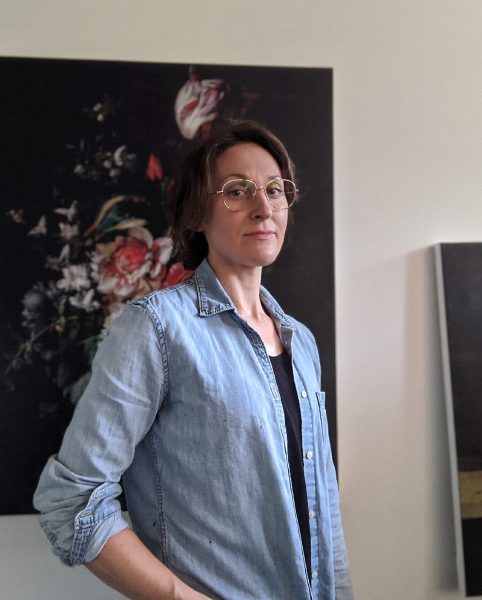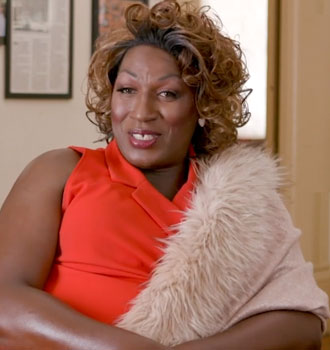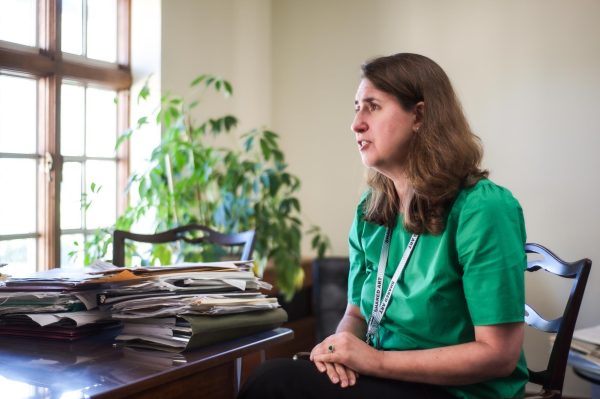On the Record with Author Mia Alvar
Photo by Bryan Rubin, Photo Editor
Filipinx-American author Mia Alvar
Mia Alvar is a writer currently based in Santa Monica, CA. She was born in the Philippines and raised in the U.S. and Bahrain. Alvar graduated from Harvard College and the School of the Arts at Columbia University. Her 2015 collection of short stories, In the Country, won the PEN/Robert W. Bingham Prize for Debut Fiction, the University of Rochester’s Janet Heidinger Kafka Prize, the Barnes & Noble Discover Great New Writers Award, and The New York Times Editor’s Choice. Her work has also appeared in One Story, The Missouri Review, The Cincinnati Review, and other publications. On Saturday, Alvar was featured as a guest speaker at the Oberlin Filipinx American Student Association’s celebration of Filipinx American Heritage Month.
This interview has been edited for length and clarity.
In the Country tells so many different stories of Filipinos and the Philippine diaspora, and each narrative feels genuine and realistic. What goes into your writing process to help you craft stories the way you do?
The process for me is a lot of reading and thinking, and it usually involves having a couple of things in mind for a story that I feel are connected, even if I’m not sure how. I’ll start reading about the time period that I want my story to be set in or the job that I think my main character has, but I don’t know anything about, or that kind of research — just taking notes as I read. Then eventually, whether it’s a deadline or something else that forces me to start making a story out of that material, that’s when it starts to come together. And the writing for me is figuring out what the connection is between those disparate things that I want to throw together in a story but don’t quite know about.
How do you make the obstacles and themes specific to the Philippine diaspora accessible to readers? Do you have a specific audience in mind when you write?
I don’t really have a specific audience in mind. I tend to be focused — when I’m writing — less on readers than on a question or obsession that I have, and trying to figure out not necessarily answers, but some kind of insight to that question. As far as making the themes accessible, I think the easiest way to do that is to focus on the mundane but important details in the stories that I hope are familiar enough to readers that they recognize them, whether they self-identify as part of the Filipino diaspora or not.
A lot of the stories focus on things like motherhood, labor, and a desire for belonging. Do you think those universal themes play into your stories or writing process?
Not explicitly, I don’t think. I didn’t set out to write about themes in general, whether that was work or parenting or anything like that. I usually start off with something else, whether it’s a setting or a type of character that I want to explore, but I think those themes kind of did end up recurring throughout the book, so I guess it was a more varied obsession for me that bubbled up as I wrote.
What does being of the diaspora mean to you as both an individual and a writer?
That’s a great question. I think what became clear to me as I was writing about the diaspora was how much commonality and connection there was between Filipino communities in Bahrain and New York and going back to the Philippines, but also how much of the opposite of those things there was — how much class distinction plays into relationships between Filipinos and the diaspora; how much disconnection between members of families plays into the diaspora. I think … both [as] an individual and as a writer, it’s about that tension between community, and that disconnection.
Are there any writers who inspire your writing or style?
Yeah, a lot of writers are inspiring for sure. I don’t know how much they show up in my style. I tend to presume that when I was first becoming a writer, it was definitely American immigrant writers writing about their “blank”-American communities that inspired me. So the first story collections by Junot Díaz, for example, or Jhumpa Lahiri, were really instrumental for me in thinking about what I wanted to do as a writer, particularly with my first book. Alice Munro has been a huge influence on me as a writer in terms of what the short story form can do and places it can go beyond what a traditional short story is supposed to look like. Sandra Cisneros was big for me as a young writer as well, again, in writing in tensions between her Mexican and American identities, and also being a female body in both of those spaces.
Have you been back to the Philippines lately? What do you make of the current political climate there?
I have been back to the Philippines recently — as far as my pattern goes — because I went back in 2015 as part of my book tour, and the last time I had been back there was 1999, so 16 years earlier. It was a great trip in many ways. I got to connect with my family in Manila, my husband’s family in Pangasinan, and I also got to promote the book and do a literary festival in Davao, which is where my father is from. And being in Davao was interesting because I was there around exactly the time when their [former] mayor, [current President of the Philippines] Rodrigo Duterte, was, after lots of goading from his many fans, announced his intention to run for president. I sort of had inklings about what life in Davao under Duterte was like, in terms of the strict curfews and rules around drinking and smoking, so I knew about his iron fist sort of vaguely. But I didn’t know about the extent of his popularity and what he was going to become for the country. I’m horrified by what’s happening in the Philippines, in terms of the war on drugs and the extrajudicial killings and all of that — as I think anyone should be.
I do think it’s part of a long continuum in Philippine history of targeting the poor and making it a crime to be poor. I think it’s taken different names at different historical moments, whether people who were accused of being communist subversives in the ’70s or Muslim insurgents at another time. But the targets tend to be the most vulnerable Filipino families, and I think it’s everybody’s problem in the Philippines and across the diaspora to try to solve.
What is the role of literature in our world, in your opinion?
It’s one of the many art forms that can inspire dialogue, connect one person’s experience to another, and make people feel like they’re not feeling things or living things in isolation when they read about someone else going through it — even if that somebody else is made up — and can give people a glimpse into lives that are very different from their own. It can inspire empathy and curiosity and maybe a relationship that way. I think all of those things, but at the same time it’s easy to overstate how much literature can accomplish in the political, real world. In terms of making political change or any sort of real social transformation, it needs the help of other forces, whether it’s other art forms or other disciplines. I don’t think a book on its own can necessarily do great things.
Do you have any projects that you’re working on now?
I’m working on a novel. It’s a sequel to the title novella in In the Country. It follows the main character Milagros as she immigrates to New York, and it also follows her daughter Jackie who — like many children of overseas Filipino workers or overseas immigrants — is left behind with promises to be sent forward down the road. So it follows Milagros in New York and Jackie in the Philippines and their relationship over time after the events of the novella.
How has being born in the Philippines and living in a variety of places affected your sense of identity?
I think it’s given me a sense of how fragile and fluid identity can be, and it’s made me very wary and suspicious of identity in general. I feel like there are moments where I can definitely say, “I feel American.” I’ve certainly lived in this country for longer than anywhere else. I have a very American sensibility when it comes to certain things. But that can be totally exploded in a moment when I experience something that makes my non-Americanness very stark and apparent. In many ways it has given me a sense of non-identity. I should say, in great moments, in positive moments, it gives me a sense of multiple identities and being able to move and feel some connection with many different communities. In less positive moments, it feels like I don’t necessarily know where I fit or what to call myself.


